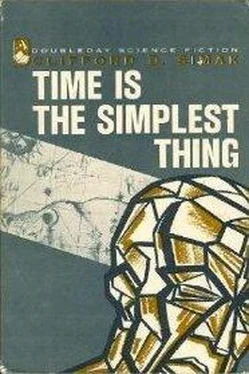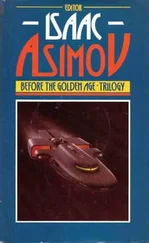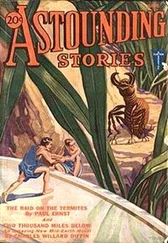Blaine slid the knapsack and canteen off his shoulder, lowered them to the ground.
“I’m going back,” he said.
“It would do no good. You couldn’t do a thing we aren’t doing now.”
“Of course,” said Blaine. “You’re very probably right. There is one chance, however, if I can get to Pierre in time . . .”
“Pierre was where Stone lived?”
“Why, yes. You knew of Stone?”
“Heard of him. That was all. A sort of parry Robin Hood. He was working for us.”
“If I could contact his organization, and I think I can . . .”
“The woman lives there, too?”
“You mean Harriet. She’s the one who can put me in contact with Stone’s group. But she may not be there. I don’t know where she is.”
“If you could wait till night, a few of us could fly you up there. It’s too dangerous in the daytime. There are too many people, even in a place like this.”
“It can’t be more than thirty miles or so. I can walk it.”
“The river would be easier. Can you handle a canoe?”
“Many years ago. I think I still know how.”
“Safer, too,” Anita said. “There’s not much traffic on the river. My cousin has a canoe, just upriver from the town. I’ll show you where it is.”
The storm sneaked in. There was no warning of it except for the gradual graying of the day. At noon the slow-moving clouds blotted out the sun and by three o’clock the sky was closed in, horizon to horizon, by a fleecy grayness that seemed less cloud than the curdling of the sky itself.
Blaine bent to his paddle, driving furiously to eat up the miles. It had been years since he had used a paddle, years since he had done anything approaching strenuous labor. His arms became stiff and numb, and his shoulders ached, and across the upper back a steel band had settled down and was tightening with every stroke he took. His hands seemed one vast blister.
But he did not slow his strokes nor the power behind them, for every minute counted. When he got to Pierre, he knew, he might be unable to locate immediately the group of parries who had worked with Stone, and even if he found them they might refuse to help him. They might want to confirm his identity, they might want to check his story, they might quite rightly suspect him as a spy for Finn. If Harriet were there, she could vouch for him, although he was not sure what her status with the group might be nor what her word was worth. Nor was he even sure that she would be there.
But it was a last, long chance. It was the final hope he had and he could not shirk it. He must get to Pierre, he must find the group, he must make them understand the urgency of the situation.
For if he failed, it spelled the end of Hamilton and of all the other Hamiltons that might be in the world. And it meant as well the end for the other parries who were not in the Hamiltons, but who lived out precarious, careful lives in the midst of normal neighbors.
Not all of them, of course, would die. But all, or nearly all, would be scattered to the winds, to hide in whatever social and economic nooks and crannies they might be able to devise. It would mean that the parries would lose on a world-wide basis whatever tacit accommodations or imperfect understandings they had been able to establish with their normal neighbors. It would mean another generation of slowly coming back, of regaining, item after painful item, what they would have lost. It would mean, perhaps, another fifty years to ride out the storm of rage, to await the growth of another generation’s tolerance.
And in the long picture that stretched ahead, Blaine could see no sign of help — of either sympathy or assistance. For Fishhook, the one place that could help, simply would not care. He had gained at least that much understanding of the situation from his contact with Kirby Rand.
The thought left the taste of bitter ashes in his mind, for it took away the last comfort that he had in all the world — the memory of his days in Fishhook. He had loved Fishhook; he had fought against his fleeing from it; he had regretted that he’d left it; at times he’d wondered if he should not have stayed. But now he knew that he had stayed too long, that perhaps he never should have joined it — for his place was here, out here in the bitter world of the other parries. In them, he realized, lay the hope of developing paranormal kinetics to their full capacity.
They were the misfits of the world, the outcasts, for they deviated from the norm of humanity as established through all of history. Yet it was this very deviation which made them the hope of all mankind. Ordinary human beings — the kind of human beings who had brought the race this far — were not enough today. The ordinary humans had pushed the culture forward as far as they could push it. It had served its purpose; it had brought the ordinary human as far as he could go. Now the race evolved. Now new abilities had awoke and grown — exactly as the creatures of the Earth had evolved and specialized and then evolved again from that first moment when the first feeble spark of life had come into being in the seething chemical bath of a new and madcap planet.
Twisted brains, the normal people called them; magic people, dwellers of the darkness — and could anyone say no to this? For each people set its standards for each generation and these standards and these norms were not set by any universal rule, by no all-encompassing yardstick, but by what amounted to majority agreement, with the choice arrived at through all the prejudice and bias, all the faulty thinking and the unstable logic to which all intelligence is prone.
And he, himself, he wondered — how did he fit into all of this? For his mind, perhaps, was twisted more than most. He was not even human.
He thought of Hamilton and of Anita Andrews and his heart cried out to both — but could he demand of any town, of any woman, that he become a part of either?
He bent to the paddle, trying to blot out the thinking that bedeviled him, trying to smother the rat race of questions that were twisting in his brain.
The wind, which had been a gentle breeze no more than an hour before, had shifted and settled somewhat west of north and had taken on an edge. The surface of the river was rippled with the driving wind and on the long, straight stretches of water there was hint of whitecaps.
The sky came down, pressing on the Earth, a hazy sky that stretched from bluff to bluff, roofing in the river and shutting out the sun so that birds flew with uneasy twitterings in the willows, puzzled at the early fall of night.
Blaine remembered the old priest, sitting in the boat and sniffing the sky. There was weather making, he had said; he could smell the edge of it.
But weather could not stop him, Blaine thought fiercely, digging at the water frantically with the paddle. There was nothing that could stop him. No force on Earth could stop him; he couldn’t let it stop him.
He felt the first wet sting of snow upon his face and up ahead the river was disappearing in a great, gray curtain that came sweeping downstream toward him. He could hear distinctly the hissing of the snow as it struck the water and behind it the hungry moaning of the wind, as if some great animal were running on a track, moaning in the fear that it would not catch the thing that ran ahead.
Shore was no more than a hundred yards away, and Blaine knew that he must get there and travel the rest of the way on foot. For even in his desperate need of speed, in his frantic fight with time, he realized that he could not continue on the river.
He twisted the paddle hard to head the canoe for shore and even as he did the wind struck and the snow closed in and his world contracted to an area only a few feet in diameter. There was only snow and the running waves that fled beneath the wind, tossing the canoe in a crazy dance. The shore was gone and the bluffs above it. There was nothing but the water and the wind and snow.
Читать дальше








